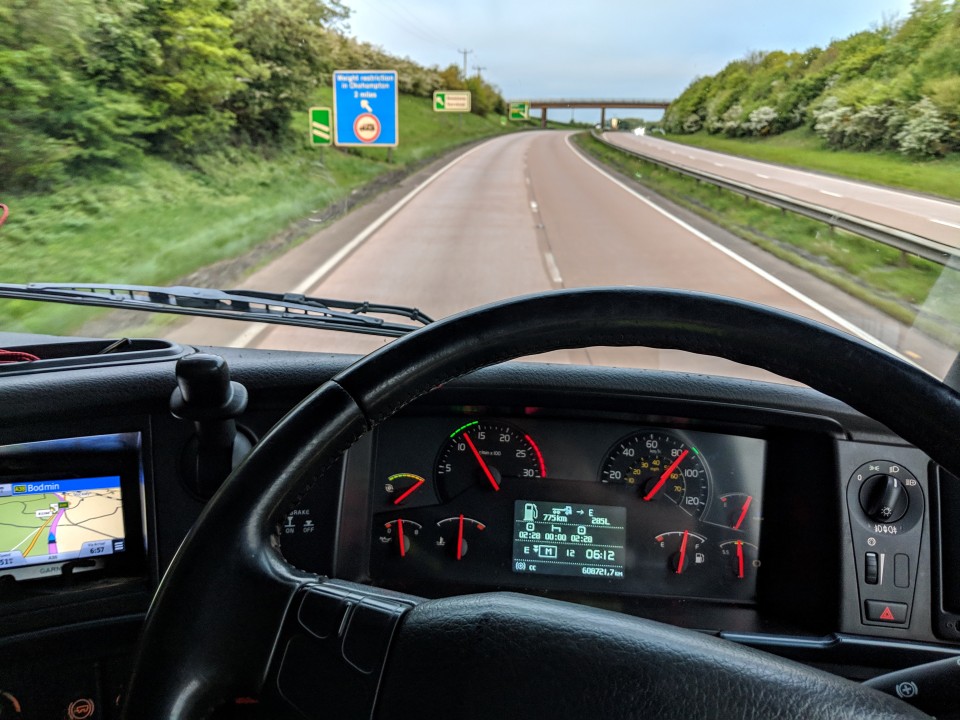
Susie Jones
Скучно ви е по време на път?
Създаден: 27.08.2024
•
Актуализирано: 27.08.2024
Средностатистическият шофьор на камион прекарва около 12 часа зад волана всеки ден. Безкрайното време на пътя може да звучи привлекателно, но реалността е коренно противоположна. Безбройните бензиностанции, местата за почивка и дългите часове могат да станат досадни. Шофьорите на камиони често прекарват свободното си време далеч от дома и предотвратяването на скуката може да се окаже предизвикателство.
Според неотдавнашно проучване на Convoy скуката е едно от основните предизвикателства пред шофьорите на камиони. Какъв е ефектът от скуката върху благосъстоянието на шофьорите? И как шофьорите на камиони могат да се забавляват?
Как скуката влияе на благосъстоянието на водача
Умората, изолацията, самотата и липсата на умствена стимулация са често срещани проблеми за шофьорите. Някои шофьори могат да се справят с тези проблеми с нездравословни механизми за справяне - като преяждане, пушене или прекомерна консумация на кофеин. С течение на времето тези навици могат да окажат отрицателно въздействие върху психичното здраве.
Въпреки това, тъй като разговорите за психичното здраве се подобряват, все повече шофьори избират различен начин за борба с него. Попитахме шофьорите на камиони във Facebook какво правят, когато скуката ги завладее.
"Аудиокниги, предимно по психология. Музика, разговори с близки хора или слушане на радио. Или изключвам всичко и съществувам спокойно със собствените си мисли", казва Найджъл.
Други споменават, че разговорите с близките по телефона са им помогнали. Ашли заявява:
"Говоря с приятелите си в групов чат. Честно казано, ако ги нямах, отдавна щях да съм се отказал. Пътят изхвърля някои боклуци и без разговори с наистина добри приятели никога нямаше да оцелея."
По същия начин Карл смята, че "груповият чат с приятели е задължителен".

Предотвратяване на скуката зад волана
Противно на общоприетото схващане, превозът с камион е физическо усилие - шофьорите се нуждаят от координация и концентрация, за да избегнат инциденти. Въпреки това продължителното седене зад волана може да доведе до умора. Рискът от самозадоволяване в работата може да възникне, особено ако шофьорът познава добре маршрута си. Как шофьорите могат да се справят със самодоволството зад волана?
Независимо дали става въпрос за слушане на подкаст или за запомняща се мелодия, водачите трябва да изберат нещо, което да поддържа съзнанието им будно. Съставихме списък с неща, които да предотвратят скуката зад волана.
Подкасти: Шофьорът на камион Марти слуша "десетки подкастове", докато шофира. Подкастите са отличен начин да разнообразите работата си и да научите нещо ново. Вижте този полезен списък с подкасти за камиони
Музика: "Музика, музика и още веднъж музика" е начинът, по който Ричард се бори със скуката. Независимо дали става дума за слушане на радио или за пеене на плейлист, музиката е отличен начин да поддържате ума буден.
Вземете си почивка: Въпреки че шофьорите спазват строги срокове и правила на тахографа, излизането от кабината, когато започне да им е скучно, помага на ума да се пренасочи.
Скука по време на престой
Шофьорите на камиони са изправени пред допълнителни предизвикателства, за да се забавляват след края на смяната си. Задължително е да се предприеме проактивен подход за предотвратяване на скуката през това време. Съставихме списък с начини за прекарване на часовете.
Местоположение: Спирките за товарни автомобили, които предлагат широка гама от съоръжения и общи условия, са отличен начин за облекчаване на скуката. Някои от тях действат като социален център, където шофьорите на камиони могат да споделят сходни преживявания. Отидете на нашата страница с местоположения, за да видите какви съоръжения предлагат нашите партньори за услуги SNAP
Упражнения: Ежедневната разходка или творческите тренировки могат да предотвратят скуката и да гарантират, че ще останете във форма и в добро здраве. Вижте нашите съвети за поддържане на здравето по време на път
Услуги за стрийминг: Гледайте най-новото телевизионно предаване или преглеждайте социалните мрежи. Шофьорът на камион Стив обича да "скролва и коментира във Facebook и да гледа Netflix", за да убие времето си.
Хобита: Възможностите са безкрайни. Учене на инструмент, изучаване на чужд език, рисуване, писане и др. Хобито е ефективен начин за предотвратяване на скуката.
Готвене: Готвенето на храна в кабината има много предимства. То не само предотвратява скуката, но и спестява пари и е по-здравословно.
Поддържайте връзка с близките си: Престоят на шофьорите на камиони е идеална възможност да се свържат с най-близките си хора. Видеоразговорите са ефективен начин да се почувствате по-близо до семейството и приятелите си.
Отпуснете се: шофьорите на камиони могат да се сблъскат със стресови ситуации. Пълното отпускане след смяна може да подобри благосъстоянието на водача. Техниките за релаксация, като упражнения за дълбоко дишане и медитация, намаляват стреса.
Въпреки че някои шофьори се наслаждават на уединението и независимостта, които предлага откритият път, борбата със скуката все още е предизвикателство за мнозина. Поради естеството на работата, шофьорите на камиони често изпитват дълги периоди на скука. Въпреки това, за да подобрят благосъстоянието, удовлетворението от работата и безопасността на пътя, те трябва да намерят начини да я облекчат. Независимо дали става въпрос за съсредоточаване върху текущата задача, слушане на радио или разговори с приятели и семейството, повечето шофьори на камиони могат да намерят работещо за тях решение.

Къде спят шофьорите на камиони?
Повечето шофьори спят в кабините си, тъй като те са добре оборудвани за комфортен нощен сън. Основната спална кабина включва легло, място за съхранение, осветление и електрически контакти - това я превръща в дом далеч от дома.
Поради сегашния недостиг на места за паркиране в Европа много шофьори паркират на уличните платна. Това се счита за опасно и прави водача уязвим за кражби. От ноември 2017 г. водачите на тежкотоварни автомобили в Обединеното кралство трябва да правят редовни седмични почивки на подходящи места за почивка (като сервизни зони и спирки за камиони).
Схемата Depot Parking на SNAP позволява на автопарковете да предлагат своите места за паркиране на камиони в мрежата, като по този начин намаляват недостига и помагат на шофьорите да избягват уязвими ситуации. Освен това SNAP предоставя над 450 сервизни партньори в цяла Европа, при които шофьорите могат да паркират. Отидете на нашата страница maps page, за да научите повече.
Защо шофьорите на камиони оставят вратите на ремаркетата си отворени?
Ако някога сте пътували по главен път през нощта, може би сте забелязали камиони, паркирани с отворени врати на ремаркетата. Много шофьори правят това, за да отблъснат крадците, тъй като се предполага, че ако вратата на ремаркето е отворена, няма какво да се открадне. Това се прави предимно при ремаркета със странична завеса, тъй като пречи на крадците да разкъсат завесата, за да видят какво има вътре.



